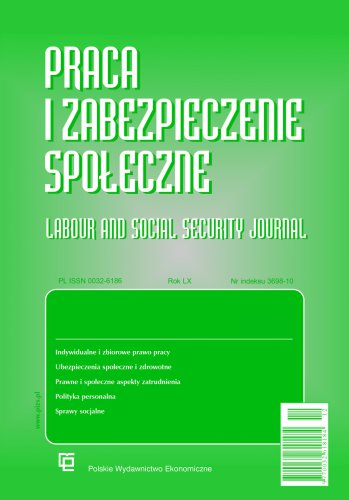The Personal Scope of Collective Bargaining in the Constitution of the Republic of Poland versus International and EU law
The Constitution of the Republic of Poland provides for the right to bargain and includes it among the fundamental human rights (freedoms). However, the Constitution of the Republic of Poland does not determine the subjective scope of the right to bargain as this scope is shaped by international standards. It follows from Article 59 (4) of the Constitution of the Republic of Poland, that the right to bargain may be subject only statutory limitations only to the extent permitted by international agreements binding Poland. Meanwhile, the subjective scope of the right to collective bargaining defined in the standards of the International Labour Organization differs from the subjective scope of this right resulting from the opinion of the Court of Justice of the European Union. In this context, the aim of the article to justify the thesis that meeting the requirements of international law is in conflict with EU law.
References
Bibliografia/References
Aloisi, A. (2019). Negotiating the digital transformation of work: non-standard workers, voice, collective rights and mobilisation practices in the platform economy, European University Institute.
Countouris, N., De Stefano, V. and Lianos, I. (2021). The EU, Competition and Workers' Rights, CELS Research Paper Series, (2).
Florek, L. (1997). Zgodność przepisów prawa pracy z Konstytucją, Praca i Zabezpieczenie Społeczne, (11).
Freedom od Association (2018). Compilation of decisions of the Committee on Freedom of Association, Geneva.
Grzebyk, P. (2016). Wolność zrzeszania się w związki zawodowe a zatrudnienie cywilnoprawne. Glosa do wyroku Trybunału Konstytucyjnego z 2.06.2015 r. (K 1/13), Przegląd Sądowy, (11).
Grzebyk, P. (2019). Od rządów siły do rządów prawa. Polski model prawa do strajku na tle standardów unijnego i międzynarodowego prawa pracy. Wydawnictwo Naukowe Scholar.
Grzebyk, P., Pisarczyk, Ł. (2019). Krajobraz po reformie. Zbiorowa reprezentacja praw i interesów zatrudnionych niebędących pracownikami, Praca i Zabezpieczenie Społeczne, (1). DOI 10.33226/0032-6186.2019.1.10
Gyselen, L. (2000). Glosa do wyroków TS z dnia 21 września 1999 r., C-67/96, C-115/97, C-117/97 i C-219/97, Common Market Law Review, (2).
Hajn, Z. (2010). Prawo zrzeszania się w związkach zawodowych – prawo pracowników czy prawo ludzi pracy W: A. Wypych-Żywicka, M. Tomaszewska, J. Stelina (Red.), Zbiorowe prawo pracy w XXI wieku. Fundacja Rozwoju Uniwersytetu Gdańskiego.
Hajn, Z. (2013). Zbiorowe prawo pracy. Zarys systemu. Wolters Kluwer.
Hajn, Z. (2021). Pojęcie układu zbiorowego pracy i jego uznanie przez państwo a reprezentatywność związkowa, Państwo i Prawo, (5).
Kohutek, K. (2015). Glosa do wyroku TS z dnia 4 grudnia 2014 r., C-413/13, LEX/el.
Kowalczyk, A. (2016). Monopol związkowy w zakresie prawa prowadzenia i inicjowania sporu zbiorowego a konstytucyjne prawo do rokowań zbiorowych, Studia z zakresu prawa pracy i polityki społecznej, (23).
Lianos, I., Countouris, N., De Stefano, V. (2019). Rethinking the Competition Law/Labour Law Interaction: Promoting a Fairer Labour Market, European Labour Law Journal, 10(3).
Maceratini, A. (2021). New Technologies between Law and Ethics: Some Reflections, Białostockie Studia Prawnicze, 21(3). DOI: 10.15290/ bsp.2021.26.03.01
Materna, G. (2015). Glosa do wyroku TS z dnia 4 grudnia 2014 r., C-413/13, Europejski Przegląd Sądowy, (4).
Mitrus, L. (2020). W: A. Wróbel (Red.), Karta Praw Podstawowych Unii Europejskiej. Komentarz, Warszawa, Legalis/el.
Perez del Prado, D. (2022). Podmiotowy wymiar rokowań zbiorowych w gospodarce platformowej – perspektywa hiszpańska, W: Ł. Pisarczyk, E. Brameshuber, J. M. M. Boto (Red.), Rokowania zbiorowe a rynek platform cyfrowych. Tradycyjne narzędzie dla nowych modeli biznesowych. Wolters Kluwer.
Sanetra, W. (1998). Konstytucyjne prawo do rokowań, Praca i Zabezpieczenie Społeczne (12).
Schmidt-Kessen M. José, Bergqvist Ch., Jacqueson C., Lind Y., Huffman M. (2021) "I'll call my Union", said the driver – Collective bargaining of gig workers under EU competition rulet, Copenhagen Business School Law Research Paper Series, (20–43).
Standing, G. (2014). Prekariat. Nowa niebezpieczna klasa. Wydawnictwo Naukowe PWN.
Surdykowska, B. (2016). Między samozatrudnieniem fałszywym a zależnym, Praca i Zabezpieczenie Społeczne, (2).
Vossestein, A. J. (2002). Glosa do wyroków TS: z dnia 19 lutego 2000 r., C-35/99 i z dnia 19 lutego 2002 r., C-309/99, Common Market Law Review, (4).
Świątkowski, A.M. (2016), Konstytucyjna koncepcja pracownika, Monitor Prawa Pracy, (1).
Unterschütz, J. (2020). Europejska autonomiczna koncepcja pracownika, Monitor Prawa Pracy (4).

